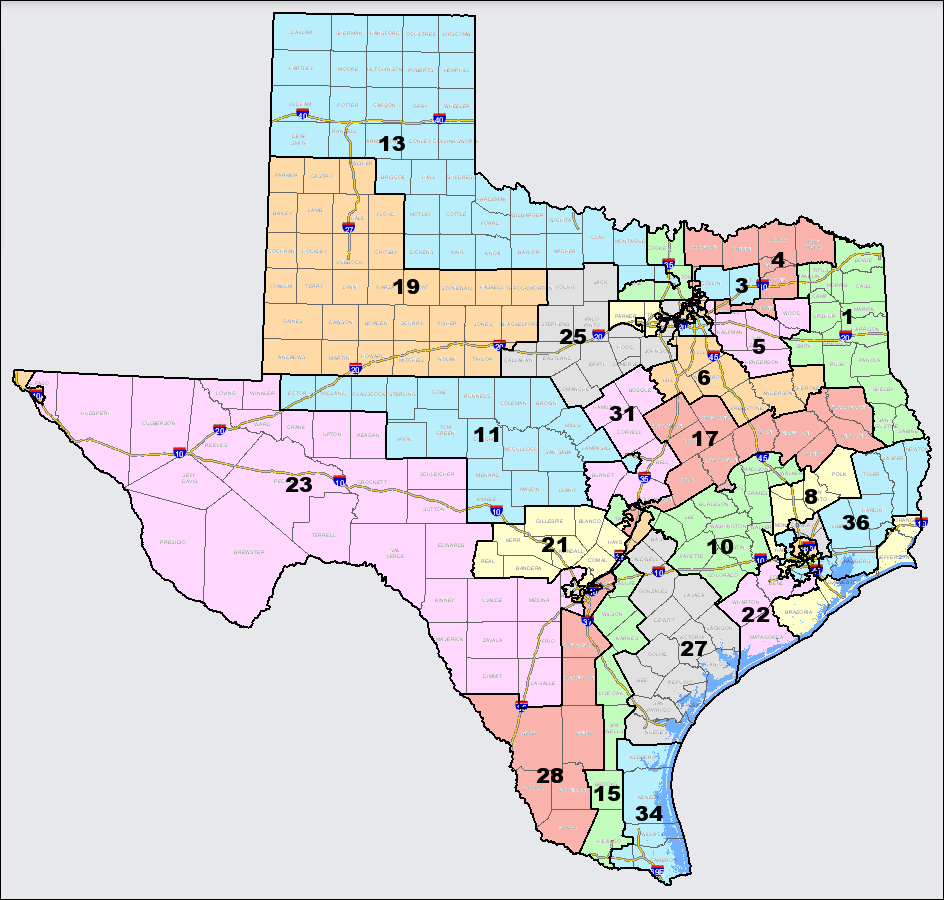By Jim Ellis
Dec. 17, 2021 — Texas became the first state to see candidate filing close for the 2022 elections, so the campaign season has officially been launched.
In the Lone Star State, candidates file with their respective state party organizations, or county parties if their race is fully contained within one entity, and not the Secretary of State. Therefore, the filings might not yet be fully recorded and approved. The statewide primary is scheduled for March 1. If no candidate for whatever office does not receive majority support in the first election, a runoff between the top two finishers will occur on May 24.
What we know so far is that Gov. Greg Abbott (R) will face a significant Republican primary challenge from former Florida congressman and ex-Texas Republican Party chairman Allen West and former Dallas state Sen. Don Huffines. The latter man, who was defeated for re-election in 2018, has the ability to self-fund a statewide primary campaign. Former congressman and 2020 presidential candidate Beto O’Rourke will be the Democratic nominee as he faces only minor opposition in the party primary.
Regardless of the level of competition, Gov. Abbott, though his approval ratings are at a low ebb in his seven-year career as the state’s chief executive, is a heavy favorite in both the Republican primary and the 2022 general election.
The main constitutional office of interest is the attorney general’s race. Here, embattled incumbent Ken Paxton (R), who has for years been under a federal SEC indictment that has yet to move forward, and who has been publicly accused of having an ongoing extra-marital affair, faces three strong candidates for re-nomination: State Land Commissioner George P. Bush, US Rep. Louie Gohmert (R-Tyler), and state Supreme Court Justice Eva Guzman.
Though Paxton has personal and legal problems, his favorability ratings among Republican primary voters is still surprisingly high. Forcing the two-term attorney general into a runoff election, however, is a clear possibility.
With the state having no Senate race in 2022, the federal focus turns to the new 38-member US House delegation. Texas gained two seats in national reapportionment, thus increasing their delegation size from 36 to 38 seats. The state will wield 40 electoral votes in the next presidential election, second only to California’s reduced 54.
The congressional delegation will feature six open seats, including new districts 37 and 38. Rep. Lloyd Doggett (D-Austin), who currently represents the 35th District, which stretches from Austin to San Antonio, is seeking re-election in the neRep. w 37th, which is a safely Democratic seat fully contained within Travis County. Therefore, the 35th, and not the 37th, will be open.
In addition to the 35th and the new 38th District — a Republican seat fully contained within Houston’s Harris County — four incumbent-held seats will also be open. As mentioned above, Rep. Gohmert is leaving his 1st District to run for attorney general, while Reps. Kevin Brady (R-The Woodlands), Eddie Bernice Johnson (D-Dallas), and Filemon Vela (D-Brownsville) are retiring.
Though Vela is not seeking re-election, his Brownsville-anchored 34th District will be filled by fellow incumbent Vicente Gonzalez (D-McAllen). Instead of running in his 15th District, Gonzalez has chosen to move to the more Democratic 34th, and with Rep. Vela’s support. The 15th District, in its new form, would have gone to former President Trump by approximately three percentage points and will be hotly contested next year. In Gonzalez’s final election from the 15th, the congressman recorded only a 50.5 victory percentage.
Of the 32 incumbents seeking re-election, only 10 will be unopposed for their respective party nominations. Two members, Reps. Austin Pfluger (R-San Angelo) and Jodey Arrington (R-Lubbock), are completely unopposed as neither drew Republican nor Democratic competition.
Reps. Roger Williams (R-Austin), in his new 25th District that brings him back to north Texas, and the 6th District’s Jake Ellzey (R-Midlothian) have only one Republican primary opponent apiece, and neither drew a Democratic candidate. Though Rep.John Carter (R-Georgetown) has four Republican primary opponents, no Democrat filed in his much more Republican new 31st District. His past two general elections have been competitive.
The most significant primary contests will certainly involve Reps. Henry Cuellar (D-Laredo) and Van Taylor (R-Plano). Cuellar again faces his 2020 primary opponent, attorney Jessica Cisneros, who held him to a 52-48 percent victory and has support from the Democratic Socialist movement. A minor candidate is also in the primary.
Taylor has drawn opposition from former three-term Collin County Judge (Executive) Keith Self. Collin County houses more than 1 million residents, with the overwhelming majority living within Rep. Taylor’s 3rd CD, thus Self is a known political figure.
Though the new Texas map is incumbent friendly, we will still see competition in a number of seats both in the primary and general elections. While the state will likely be politically stable, particularly from the Republican perspective, Texas will still host its fair share of active 2022 congressional campaigns.

